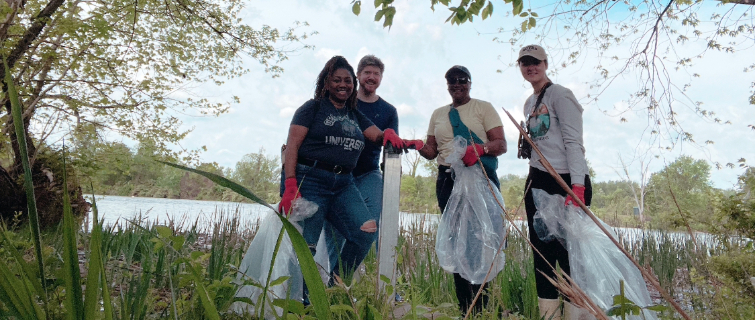
This article is from the 2023–2024 Dean's Report.
In 2015, Pope Francis issued a watershed teaching document on the environment, Laudato Si and Jesuit institutions around the world have responded by making environmental sustainability a major focus of their collective efforts. At Georgetown, this emphasis is apparent in myriad ways, including the addition of “Care for our Common Home” to the Spirit of Georgetown values, the creation of new environment-focused academic programs, and a renewed commitment to sustainability in policies and practices.
Yet “Laudato Si” is about more than preserving the natural world from the negative consequences of climate change. Pope Francis, owing to his Jesuit formation and experience in the cities of Latin America, dedicates a great portion of his teaching to the built environment, i.e. the physical arrangement of buildings and other sites that make up a city’s landscape.
“Many cities are huge, inefficient structures, excessively wasteful of energy and water. Neighborhoods, even those recently built, are congested, chaotic, and lacking in sufficient green space,” writes Pope Francis. He reflects that addressing these physical systems means attending to the needs of urban populations: “We have to realize that a true ecological approach always becomes a social approach; it must integrate questions of justice in debates on the environment, so as to hear both the cry of the earth and the cry of the poor.” The vision of this integration, according to Pope Francis, is called the “ecology of daily life,” where authentic human flourishing in cities occurs alongside protection of natural resources and preservation of the natural environment.
SCS has made “Care for our Common Home” come alive in significant ways. The School, known for its innovative and inclusive approaches to integrating Jesuit values among its students, faculty, and staff, has developed academic programs dedicated to addressing the social and environmental needs of cities. The Master’s in Urban & Regional Planning and the Master’s in Real Estate are two examples of SCS programs that intentionally integrate Jesuit values into program design, helping students grow their professional skills while contributing to the common good through projects that positively impact urban communities. What makes these programs so unique is their explicit focus on the meaning of place, taking location as a point of departure for deeper understanding and more effective professional practices.
– Pope Francis
Care for Our Common Home in the Classroom
The Master’s in Real Estate, for example, dedicates an entire section of its capstone course to a client-based opportunity to support faith-based organizations seeking to convert their existing land and property into needed affordable housing. As many religious institutions in the U.S. experience declines in membership and regular attendance, leaders of these congregations are exploring ways to adapt their physical presence in cities while still advancing their mission. Increasingly, more attention is being paid by government and civil society to the positive role that these faith-based organizations can play in addressing the national crisis of an affordable housing shortage, as well as contributing more environmentally sustainable developments.
Initiated by faculty member Robert Cristiano, Ph.D, the Georgetown Affordable Housing Initiative gives Real Estate students the opportunity to complete feasibility studies for churches across the United States and Canada that desire to develop affordable housing on their surplus land as a way to earn revenue and fulfill their mission at the same time. Capstone students have an opportunity to work on real-world projects, conducting much needed feasibility studies for religious organizations.
As of 2024, 111 of these studies have been produced by Real Estate students. Cristiano has established a working relationship with the United Methodist Church (UMC) which has greatly benefited from the partnership with Georgetown SCS, leading to at least six local UMC projects being under contract to find development partners to realize their plans. “There is an affordable housing crisis in America. There is also a growing crisis in America’s churches with declining congregations and increasing expenses. The Georgetown Affordable Housing Initiative provides a solution for both,” said Cristiano. “Our communities obtain needed affordable housing, and our churches become financially secure with long-term sustainable income to support their ongoing ministry.”
Both Cristiano and Glenn Williamson, faculty director and associate professor of the practice of the Real Estate program, hope that this model can be scaled and its curriculum shared with other universities across the country.
Another more global example of real-world impact comes from the Master’s in Urban and Regional Planning program. Faculty Director Uwe Brandes has instituted a partnership with the global environment research non- profit World Resources Institute (WRI) to advance climate change mitigation through inspiring action by faith communities around the world.
– Dr. Robert Cristiano
Known as “Science-based Targets for Faith,” the project between WRI and Georgetown has led to the creation of a comprehensive science-based targets framework, which is intended to help faith-based organizations around the world measure, monitor, and reduce their carbon emissions. Created with the research assistance of Urban & Regional Planning students, the framework is an innovative effort to better map and inventory the physical assets and environmental performance of faith-based facilities around the world.
“Around the world, faith-based organizations are at the front line of climate adaptation, and our initiative with WRI seeks to empower them to adopt the management practices that incorporate science-based targets for emissions reduction,” commented Brandes, principal investigator for the initiative. “Since more than four out of five people around the world have a personal experience with the real assets owned by faith-based organizations, this work has an outsized local and global impact.”
By developing the capacity of these mission-serving institutions to better track their environmental outcomes, Georgetown SCS is helping realize Pope Francis’ vision for a greener world.
Service in the Heart of D.C.
SCS’s commitment to “Care for Our Common Home” includes service opportunities that contribute to environmental sustainability in our home of Washington, D.C. As part of Earth Month last April, the SCS community, under the leadership of Keenan Courtland, program director for the Business & Management degree programs, organized a day of service with Anacostia Riverkeeper, a local nonprofit dedicated to “protect and restore the Anacostia River for all who live, work, and play in its watershed, and to advocate for a clean river for all its communities.” The SCS group of students, faculty, and staff spent a day removing trash from the Anacostia River Watershed and learning about how to make a bigger collective impact on the natural ecosystem.
Courtland hopes that service and learning opportunities extend beyond Earth Month and become more ingrained in the everyday practices of the SCS culture. “There is something invigorating about physically impacting your community and leaving something better than you found it,” he said. “Waiting until next April is not enough for us to harness the collective power we have here at SCS; we must identify ways to impact our community and build regular intention to this vital work.”
As the Capitol Campus continues to grow in a dynamic and evolving neighborhood, SCS is in an important position to help Georgetown advance the Jesuit mission of more equitable and sustainable engagement in the city of Washington, D.C., and cities around the world. St. Ignatius of Loyola, founder of the Jesuits, initiated a novel urban strategy five centuries ago by intentionally locating his religious order and its works in cities. SCS is playing a major part in realizing this Ignatian vision of urban engagement.
– Keenan Courtland
